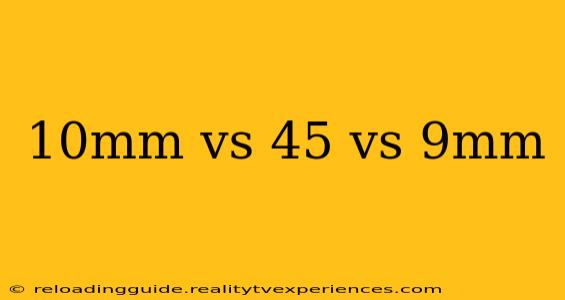Choosing the right handgun caliber is a crucial decision for any shooter, whether you're a seasoned professional or a first-time buyer. This detailed comparison of 10mm Auto, .45 ACP, and 9mm Parabellum will help you understand the strengths and weaknesses of each, allowing you to make an informed choice based on your needs and preferences.
Ballistics: Power and Recoil
Let's start with the raw power and resulting recoil:
-
10mm Auto: This round packs a significant punch, boasting higher muzzle energy and velocity than both .45 ACP and 9mm. This translates to greater stopping power and effective range. However, the considerable recoil can be challenging for some shooters, particularly those with less experience.
-
.45 ACP: Known for its substantial bullet diameter and impressive stopping power at close range, the .45 ACP delivers heavy recoil. While its muzzle velocity is lower than the 10mm, its larger mass transfers significant energy upon impact.
-
9mm Parabellum: This round offers a balance between power and control. It generates less recoil than both the 10mm and .45 ACP, making it easier to shoot accurately, especially in rapid succession. While its stopping power is lower than the other two, advancements in bullet technology have significantly improved its effectiveness.
Table Summarizing Ballistic Differences:
| Caliber | Muzzle Energy (Approximate) | Muzzle Velocity (Approximate) | Recoil | Stopping Power |
|---|---|---|---|---|
| 10mm Auto | High | High | High | High |
| .45 ACP | Medium-High | Medium | High | High (Close Range) |
| 9mm Parabellum | Medium | Medium-High | Low | Medium-High |
(Note: Exact figures vary significantly depending on the specific ammunition, barrel length, and firearm.)
Accuracy and Controllability
Recoil directly impacts accuracy and controllability. Here's a breakdown:
-
9mm: The lower recoil allows for faster follow-up shots and greater accuracy, especially during rapid fire. This makes it an excellent choice for self-defense scenarios requiring multiple shots.
-
.45 ACP: The substantial recoil can make rapid follow-up shots more challenging, impacting accuracy, especially for less experienced shooters.
-
10mm: Similar to the .45 ACP, the high recoil presents a significant hurdle for maintaining accuracy during rapid fire. However, skilled shooters can manage this recoil effectively.
Applications and Intended Use
The ideal caliber depends heavily on the intended use:
-
Self-Defense (Home Defense): The 9mm's manageable recoil and high capacity magazines make it a popular choice for home defense. The .45 ACP's stopping power remains a strong argument for some, while the 10mm offers a potent option for those prioritizing maximum stopping power.
-
Concealed Carry: The 9mm's smaller size and lighter recoil make it a preferred choice for concealed carry. The .45 ACP is also viable but requires more practice to manage recoil effectively. The 10mm is less common for concealed carry due to its size and recoil.
-
Hunting/Large Game: While not typically a first choice for hunting large game, the 10mm offers significantly more power than the 9mm or .45 ACP, making it more suitable for this purpose with appropriate ammunition selection.
-
Law Enforcement/Duty Use: The 9mm is a very popular choice for law enforcement due to its manageable recoil, accuracy, and high capacity magazines. The 10mm has seen some adoption, particularly in specialized units. The .45 ACP, while less common, still holds a place in certain departments.
Ammunition Availability and Cost
Ammunition availability and cost vary by location and time. However, 9mm generally offers the widest availability and is often the most cost-effective option. .45 ACP ammunition is readily available, but may be slightly more expensive. 10mm ammunition can be more difficult to find and often carries a higher price tag.
Conclusion: The Right Caliber for You
There's no single "best" caliber among the 10mm, .45 ACP, and 9mm. The optimal choice depends on your individual needs, shooting experience, and intended use. Carefully consider the factors discussed above – ballistics, accuracy, intended use, and ammunition availability – to make the decision that best suits your specific requirements. Remember to practice extensively with whichever caliber you choose to become proficient and safe.

